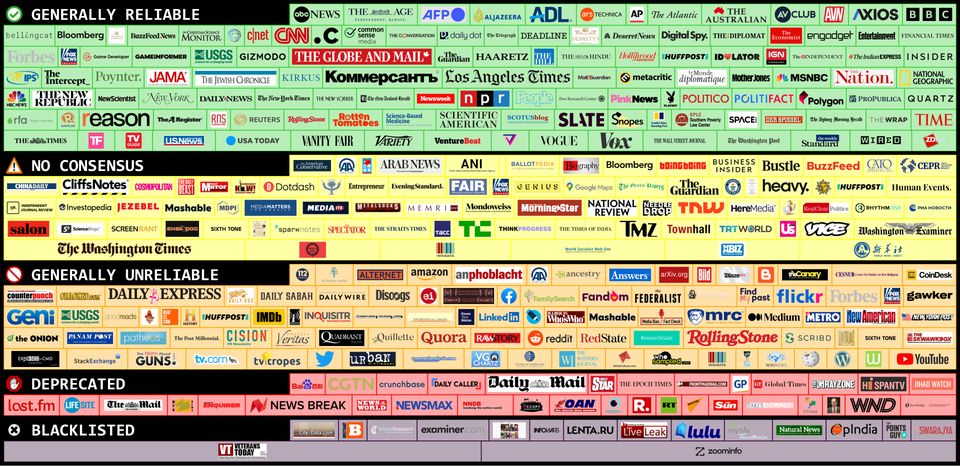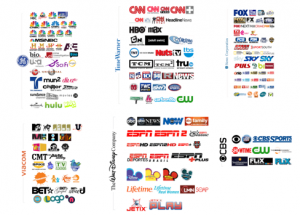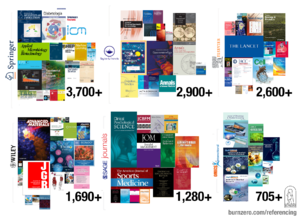Referencing: Difference between revisions
mNo edit summary |
|||
| (11 intermediate revisions by the same user not shown) | |||
| Line 1: | Line 1: | ||
'''Historically information was scarce, now | '''Historically information was scarce, but now, due to the internet information is in [[Library of Babel|overabundance]] and it's difficult to know what to [[A free press is one you pay for|trust]].''' A common reference source, Wikipedia has tried to combat this issue by listing which sources are most reliable and excluding those which prefer clicks over fact:[[File:News hierarchy.jpg|alt=News hierarchy|center|960x960px|'''Figure 1'''. Wikipedia's news reliability hierarchy]] | ||
[[File:Corporate owners-media.png|alt=Oligo|thumb|'''Figure 2'''. | [[File:Corporate owners-media.png|alt=Oligo|thumb|'''''Figure 2'''. Oligopoly of popular media.'']] | ||
However, the word ''reliable'' simply implies sources are not making things up | However, the word ''reliable'' simply implies sources are not making things up. Reliability of factual accuracy does not take into account the potential [[Cognitive biases|biases]] of each source or [[framing]] of issues to make it more digestible to specific consumers. So for <u>fact,</u> one needs to look at the scientific literature, which should be able to deduct [[framing]] and bias to get at the root of an issue. | ||
=== | === Scientific Bias === | ||
[[File:Journal oligopoly.png|alt=Journal oligopoly|thumb|'''''Figure 3'''.'' Science'','' Nature ''and'' Cell ''are considered the apex Journals however, they are part of a wider Oligopoly.'']] | |||
Although there are ongoing attempts to minimize bias in scientific research, achieving perfection is challenging. A significant issue revolves around the funding of studies, as financial support from private entities can potentially sway results in favor of commercial interests. This phenomenon, known as [[Commercial Bias|commercial bias]], occurs when science sponsored by private entities aims to obtain a return on investment, introducing an influence that may subtly distort scientific findings. | |||
''' | Another contributing factor to bias is the predominant method of disseminating research through scientific journals, most of which are controlled by a handful of private corporations (See '''Figure 3'''). These entities hold the power to approve or dismiss studies, potentially [[framing]] the scientific discourse to reflect their own agendas. This gatekeeping may be a contributing factor to the replication crisis, where a significant number of studies cannot be reliably replicated by other researchers. | ||
In conclusion, while scientific literature is generally more scrutinized than popular media, giving it better veracity, science should not be held on a pedestal as immune to bias. In response, BurnZero has implemented a [[critical analysis]] weighting system. This approach prioritizes scientific sources believed to be less influenced by bias, fostering a more objective understanding of scientific findings. | |||
Latest revision as of 07:17, 7 January 2024
Historically information was scarce, but now, due to the internet information is in overabundance and it's difficult to know what to trust. A common reference source, Wikipedia has tried to combat this issue by listing which sources are most reliable and excluding those which prefer clicks over fact:
However, the word reliable simply implies sources are not making things up. Reliability of factual accuracy does not take into account the potential biases of each source or framing of issues to make it more digestible to specific consumers. So for fact, one needs to look at the scientific literature, which should be able to deduct framing and bias to get at the root of an issue.
Scientific Bias
Although there are ongoing attempts to minimize bias in scientific research, achieving perfection is challenging. A significant issue revolves around the funding of studies, as financial support from private entities can potentially sway results in favor of commercial interests. This phenomenon, known as commercial bias, occurs when science sponsored by private entities aims to obtain a return on investment, introducing an influence that may subtly distort scientific findings.
Another contributing factor to bias is the predominant method of disseminating research through scientific journals, most of which are controlled by a handful of private corporations (See Figure 3). These entities hold the power to approve or dismiss studies, potentially framing the scientific discourse to reflect their own agendas. This gatekeeping may be a contributing factor to the replication crisis, where a significant number of studies cannot be reliably replicated by other researchers.
In conclusion, while scientific literature is generally more scrutinized than popular media, giving it better veracity, science should not be held on a pedestal as immune to bias. In response, BurnZero has implemented a critical analysis weighting system. This approach prioritizes scientific sources believed to be less influenced by bias, fostering a more objective understanding of scientific findings.


